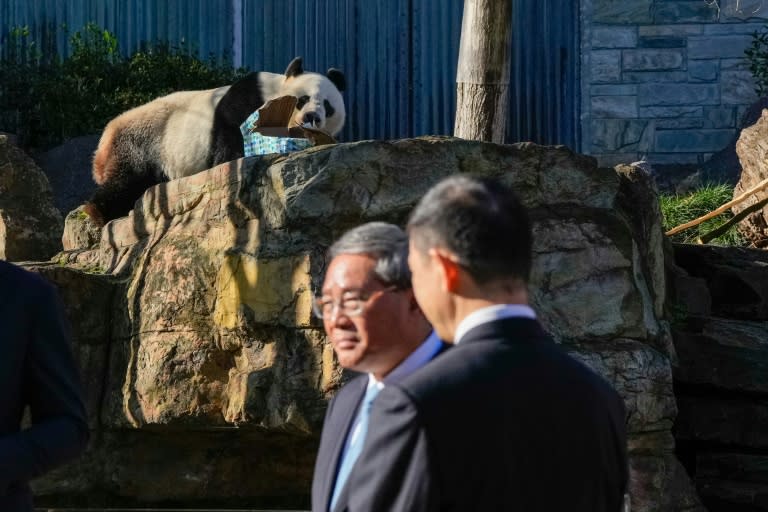Chinese Premier Li toasts warming trade ties in Australia

Chinese Premier Li Qiang mixed a dash of "panda diplomacy" with a visit to a historic vineyard on Sunday to celebrate a thaw in once-icy trade ties with Australia.
The highest ranking Chinese official to visit Australia in seven years, Li's four-day trip offers the prospect of greater trade after Beijing lifted punitive measures against a string of major Australian exports.
China is by far Australia's biggest trading partner, taking in nearly 30 percent of its exports last year including major commodities iron ore and coal.
Two-way trade reached Aus$327 billion ($216 billion) in 2023.
Setting the warmer tone, Li took a trip to Adelaide Zoo in bright sunshine and announced China would loan new "adorable" giant pandas to replace popular pair Wang Wang and Fu Ni.
The Adelaide pandas, which have failed to produce offspring since their arrival in 2009, will return to China by the end of the year.
"I guess they must have missed their home a lot," said Li, the second most powerful man in China after President Xi Jinping.
The premier said China made the panda offer to honour the wishes of Australian Foreign Minister Penny Wong, an Adelaide resident who has worked to stabilise the relationship with Beijing.
Wong said her own children would be "very happy" at the news, which she welcomed as a "symbol of goodwill".
Li then joined Wong for a lunch at the 19th century Magill Estate vineyard, home of the original Penfolds winery and now part of the Australian global winemaker Treasury Wine Estates.
Wine was among a string of Australian exports, along with coal, timber, barley, beef, and lobsters, battered by Chinese sanctions in 2020 during a diplomatic rift with the former conservative government.
Those sanctions cost Australian exporters an estimated Aus$20 billion ($13 billion) a year, including Aus$1 billion for the wine industry.
- 'Permanent tension'
The tariffs have been gradually lifted since Prime Minister Anthony Albanese's government took power in 2022 and adopted a softer diplomatic approach towards China. Lobster is one of the few exports still facing trade barriers.
Li and Albanese are set to hold talks behind closed doors in Canberra on Monday, encompassing fractious issues of foreign influence, human rights, alleged "unsafe" behaviour by China's military in the region, and their rivalry in the Pacific.
China's growing clout in the South Pacific, where it seeks to expand security and economic ties with island states traditionally allied with Australia, remains a notable point of tension.
"We're in a state of permanent contest in the Pacific. That's the reality," Wong told a television interviewer Sunday.
But the Chinese premier, who will also head to a lithium mine in Perth, is focusing his attention on economic opportunities despite areas of friction.
"Mutual respect, seeking common ground while shelving differences and mutually beneficial cooperation" are key to the relationship, Li said on his arrival in Adelaide on Saturday.
Australia has endured "a long period of deep freeze, where it was not possible to have any sort of official conversations with China", said Melissa Conley Tyler, honorary fellow at the University of Melbourne's Asia Institute.
Li's visit sends a message that "Australia is back to being seen as a friendly country rather than the unfriendly, hostile country we were seen as during those years of maximum tension," she told AFP.
djw/mtp/pbt


